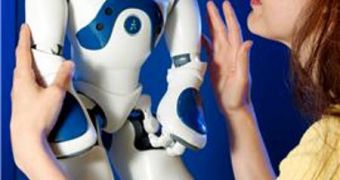A team of investigators in the United Kingdom announces the development of the first prototypes of robots that can interact with humans via emotions. The machines develop the emotions as they interact with human caregivers, and are able to express some emotions of their own, the team says. The research effort was led by UH specialist Dr Lola Canamero, who collaborated with a large consortium of universities and robotic companies from all over Europe.
The expert says that the new robots are capable to express emotions by using body language, they can also interact through emotions, understand them, and form attachments with certain humans based on that understanding. The accomplishment was a part of the interdisciplinary project called FEELIX GROWING (Feel, Interact, eXpress: a Global approach to development with Interdisciplinary Grounding). The initiative is funded by the European Commission, and is coordinated by Canamero. The scientist says that the main goal of the research team was developing robots that can interact and feel similarly to the way human babies can.
“This behavior is modeled on what a young child does. This is also very similar to the way chimpanzees and other non-human primates develop affective bonds with their caregivers,” the team leader adds. “We are working on non-verbal cues and the emotions are revealed through physical postures, gestures and movements of the body rather than facial or verbal expression,” Canamero reveals, saying that the prototype robots can express anger, fear, sadness, happiness, excitement and pride in a discernible manner.
The robots are programmed with a particular personality profile, as well as with an individual learning need. If a human caregiver expresses the right emotions, and interacts with the prototypes based on information underlying those two factors, then the bond between man and machine grows stronger. Otherwise, the robot expresses negative feelings, just like a human child, or non-human primate would under the same circumstances, AlphaGalileo reports.

 14 DAY TRIAL //
14 DAY TRIAL //